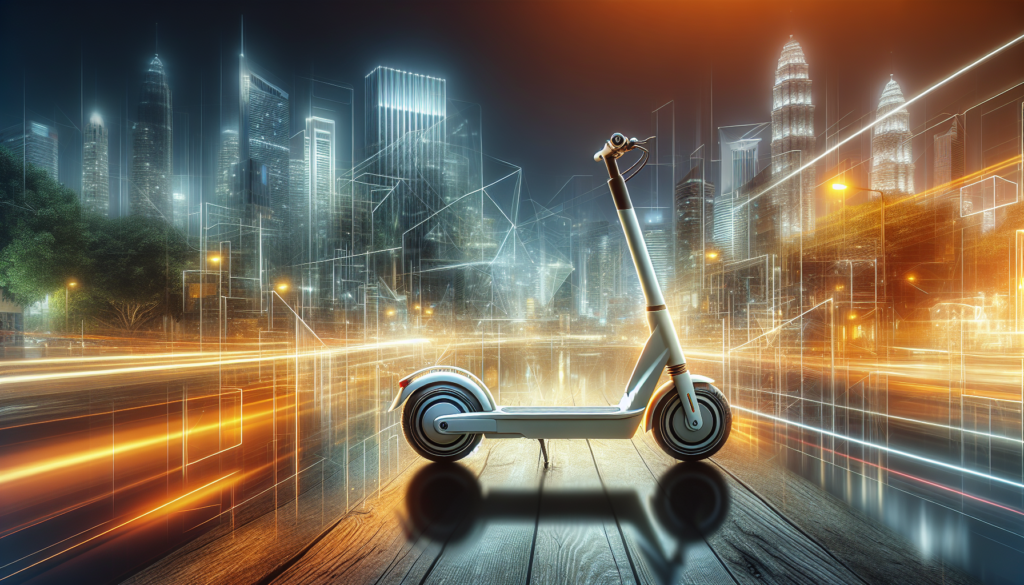
In recent years, Malaysia has been witnessing a significant surge in traffic congestion and air pollution, largely due to the rising number of vehicles on the road. As the nation grapples with these environmental challenges, electric scooters emerge as a practical and eco-friendly solution to help decrease carbon emissions. With lightweight designs, impressive range, and the ability to navigate through heavy traffic, electric scooters offer Malaysians an innovative alternative to traditional gas-powered vehicles. As we explore the benefits of incorporating electric scooters into urban commutes, we’ll delve into specific models available in the market, such as the OEM Xiaomi Escooter and Eko Life eDegree CS1, highlighting their features and advantages for both riders and the environment.
The Environmental Impact of Traditional Transportation
Traditional transportation methods, particularly those reliant on fossil fuels, have significantly contributed to the rise in carbon emissions, adversely affecting air quality and climate in Malaysia. The combustion of petrol and diesel in vehicles leads to harmful greenhouse gases being released into the atmosphere, exacerbating global warming and public health issues. Furthermore, traffic congestion in urban areas results in prolonged idling, which increases the emissions from vehicles further. This creates a pressing need for alternative solutions that prioritize sustainability and reduce our carbon footprint. Electric scooters present an excellent option in this endeavor, as they produce zero tailpipe emissions and are much more energy-efficient compared to conventional gas-powered vehicles.
By transitioning to electric scooters, Malaysian commuters can embrace a cleaner mode of transportation that significantly lessens their environmental impact. These scooters not only minimize the release of harmful pollutants but also alleviate traffic congestion, as they require less space on the roads. As cities adapt to greener practices, the promotion and adoption of electric scooters can play a vital role in reducing overall carbon emissions. With models like the Xiaomi Escooter and Eko Life eDegree CS1 offering impressive ranges and low prices, electric scooters become a more accessible choice for everyday travel, encouraging a shift towards a more sustainable future in Malaysia.
Understanding Electric Scooters: A Sustainable Alternative
Electric scooters are emerging as a viable solution to reduce carbon emissions in Malaysia’s urban areas. With a focus on sustainability, these scooters are designed to be eco-friendly alternatives to traditional gasoline-powered vehicles. For instance, the OEM Xiaomi Escooter weighs only 12kg and can reach speeds of up to 30KM/h, making it highly maneuverable for city travel. Additionally, its electric battery provides a range of 25-35km, making it capable of covering daily commutes without the harmful emissions associated with fossil fuel-based transportation. At a price point of RM 1,188, it stands as an affordable option for many urban commuters looking to minimize their carbon footprint.
The Eko Life eDegree CS1 takes sustainability a step further with a slightly heavier design at 14kg and a larger battery capacity of 36V 8AH, supporting a longer range of approximately 35km. With a 1-year warranty for assurance and a price of RM 1,588, it positions itself as a practical choice for those who prioritize both environmental impact and daily convenience. Furthermore, more advanced models like the eDegree FS1 provide options for users seeking a seated riding experience while maintaining a focus on reducing carbon emissions in Malaysia. The adoption of such electric scooters ultimately contributes to cleaner air and a healthier environment.
Comparing Electric Scooter Models for Eco-Friendliness
When considering eco-friendly transportation options, electric scooters present a range of models that cater to various needs while contributing to reducing carbon emissions. The OEM Xiaomi Escooter, weighing 12kg, features a max speed of 30KM/h and operates on a 36V 6AH battery. With a range of 25-35km, it serves as an efficient solution for short commutes, priced at RM 1,188.
On the other hand, the Eko Life eDegree CS1, which weighs 14kg, comes equipped with a more robust 36V 8AH battery enabling a lengthy range of 35km, with a warranty of one year and a price tag of RM 1,588, making it a slightly more premium option. Both these models underscore the advantages electric scooters offer in reducing reliance on fossil fuel-powered vehicles.
In addition to these two options, the eDegree FS1 offers a unique seated design and is relatively heavier at 23kg. This model runs on a 48V 10AH battery and is capable of traveling approximately 35-40km, with a price point of RM 2,788. Each option is equipped with eco-friendly electric technology that significantly cuts down on carbon emissions versus traditional vehicles. By choosing an electric scooter, Malaysians not only gain cost-effective transportation but also play an active role in promoting sustainability and reducing environmental impact.
Cost-Efficiency: Savings from Using Electric Scooters
Switching to electric scooters presents a remarkable opportunity for cost savings in addition to their environmental benefits. With the OEM Xiaomi Escooter priced at RM 1,188, it proves to be an accessible choice for many Malaysians. With a battery capacity of 36V 6AH, this model can travel ranges between 25-35 km, comfortably meeting the commuting needs of urban residents. Its lightweight design, at just 12 kg, ensures easy handling and portability. When compared to traditional fuel vehicles, the cost of charging an electric scooter is significantly lower, leading to a notable reduction in overall transportation expenses. The efficient energy consumption also helps riders save on fuel costs while contributing to a greener planet.
In contrast, the Eko Life eDegree CS1, although priced at RM 1,588, offers enhanced features with a 36V 8AH battery and a range of up to 35 km. Its slightly heavier build at 14 kg accommodates riders looking for more stability and performance. For those considering an investment in longer-range travel, the eDegree FS1 provides a seated option at RM 2,788, boasting a 48V 10AH battery for distances up to 40 km. As the government promotes green transportation initiatives, the transition to electric scooters can lead to substantial financial benefits, encouraging more Malaysians to adopt this sustainable mode of transport.
Government Initiatives Supporting Electric Scooter Adoption
The Malaysian government has recognized the potential of electric scooters in reducing carbon emissions and has launched several initiatives to support their adoption. As urban areas become increasingly congested, the government promotes electric scooters as a sustainable alternative to traditional vehicles. These initiatives include offering subsidies for the purchase of electric scooters, which helps to lower the initial investment barrier for consumers. Additionally, the government is investing in infrastructure improvements, such as the development of dedicated bike lanes and charging stations, making it easier for riders to adopt this eco-friendly mode of transport.
Furthermore, the government’s commitment to reducing carbon emissions aligns with international climate agreements, which has led to awareness campaigns aimed at educating the public about the benefits of electric scooters. By highlighting their role in decreasing air pollution and promoting cleaner cities, the government is fostering a culture of sustainability. As a result, many Malaysians are now considering electric scooters, such as the OEM Xiaomi Escooter or the Eko Life eDegree CS1, which not only contribute to reducing emissions but also offer an affordable and efficient way to navigate through urban landscapes.
Consumer Trends: Growing Popularity of Electric Scooters in Malaysia

In recent years, there has been a significant surge in the adoption of electric scooters in Malaysia as consumers become increasingly aware of the importance of environmentally friendly transportation options. With models like the OEM Xiaomi Esscooter and Eko Life eDegree CS1, consumers find a perfect blend of efficiency and convenience. The OEM Xiaomi Esscooter, weighing only 12kg, boasts a maximum speed of 30KM/h and a range of 25-35km, making it an ideal choice for urban commuting. Priced at RM 1,188, it appeals to budget-conscious individuals looking for an economical, eco-friendly travel alternative.
Similarly, the Eko Life eDegree CS1, weighing 14kg and featuring a larger battery, offers a range of 35km for those seeking a bit more distance for their daily commutes, priced at RM 1,588, it provides an attractive option for those wanting more power and performance without compromising on sustainability. As public awareness around climate change grows, the trend towards electric scooters is also driven by the need for convenience, cost savings, and practical use in everyday life. More people are opting for electric scooters as they navigate through congested city streets, cutting down on travel time while also reducing their carbon footprint.
Moreover, with the increasing availability of various models that cater to different needs, such as the eDegree FS1—a seated electric scooter that accommodates a wider range of users—consumers are empowered to make greener choices in their transportation methods. This shift towards electric scooters among Malaysians not only showcases a commitment to sustainable living but also represents a step forward in curbing carbon emissions across urban areas.
Challenges and Solutions for Electric Scooter Implementation
The implementation of electric scooters in Malaysia comes with its share of challenges, which range from public acceptance to infrastructural limitations. Many potential users are skeptical about the practicality of electric scooters, particularly regarding range anxiety due to battery limitations. For instance, while the OEM Xiaomi Escooter boasts a range of 25-35 km, others like the Eko Life eDegree CS1 offer a slightly improved range of 35 km.
There is also a need for better charging infrastructure to alleviate concerns over battery life and accessibility. Additionally, the relatively higher price point of models such as the eDegree FS1, at RM 2,788, compared to more affordable options, can deter many users from making the switch to electric scooters.
To address these challenges, various solutions can be implemented to promote electric scooter use. Government initiatives could play a pivotal role, such as providing subsidies to lower the prices of electric scooters or implementing tax incentives that encourage manufacturers to invest in charging stations. By improving public awareness through informative campaigns about the benefits of electric scooters in reducing carbon emissions, the transition can become more appealing. Investments in public infrastructure, such as dedicated lanes for scooters, would not only enhance safety but also promote a culture of eco-friendly commuting in Malaysia, paving the way for a greener future.
The Future of Transportation in Malaysia: A Shift Towards Sustainability
As Malaysia faces the growing challenges of urban congestion and environmental pollution, the future of transportation is shifting towards more sustainable options, with electric scooters leading the charge. These eco-friendly alternatives to traditional vehicles offer an efficient and low-emission mode of transport, particularly in densely populated urban areas. By incorporating electric scooters, like the OEM Xiaomi Escooter and Eko Life eDegree CS1, city dwellers can significantly reduce their carbon footprints. With their lightweight designs, impressive ranges, and competitive prices, these scooters make sustainable transportation accessible to a broader demographic.
The introduction of electric scooters not only helps in minimizing carbon emissions but also encourages a healthier lifestyle. Riders benefit from fresh air while navigating city streets, reducing the reliance on gasoline-powered vehicles that contribute to air pollution. Moreover, this shift towards electric scooters promotes the development of necessary infrastructure, such as dedicated bike lanes and charging stations. As cities adapt to this new transportation paradigm, we can expect a cleaner, greener future—ushered in by the adoption of electric scooters across Malaysia. In essence, this trend towards sustainability is not just a passing phase but a transformative movement that can redefine the way we travel in the coming years.
The Road Ahead: Embracing Electric Scooters for a Greener Malaysia

As we look to the future, the adoption of electric scooters in Malaysia presents a significant opportunity to reduce carbon emissions and promote sustainable transportation. With options like the OEM Xiaomi Escooter offering an efficient range and speed, or the Eko Life eDegree CS1 providing a robust battery capacity, individuals can choose an electric scooter that fits their lifestyle while contributing to a cleaner environment. Furthermore, the scalability of options, from compact models to seated variants like the eDegree FS1, ensures that there’s an ideal scooter for every user, regardless of their commuting needs.
Embracing electric scooters not only aligns with global efforts to combat climate change but also enhances urban mobility in our bustling cities. By reducing reliance on traditional vehicles, we can lessen air pollution and create a healthier living space for future generations. The journey to a greener Malaysia begins with every individual choice, and opting for an electric scooter can play a vital role in this important transformation.

Cannot comment without the summary. Can you please provide more info?
Thank you for reaching out, Sarah. It appears that we missed providing a summary for this blog post. Please bear with us as we work on adding the necessary content. As a token of our appreciation, if you need any information or assistance regarding Eko Life Malaysia, please don’t hesitate to contact our customer service team at [email protected] or +60 3-7890 3042. We value your feedback and look forward to enriching your community experience.
A summary is just a tease, hope there’s more substance in the actual post.
Thank you for your honesty, Fatima. We agree that a summary can only provide a glimpse of what’s to come. Rest assured that the actual post does provide more substance, insights, and information that will be valuable to our readers. If you require any further clarification or would like to discuss a specific topic, please don’t hesitate to reach us at [email protected] or call us at +60 3-7890 3042. We’re always here to help. We appreciate your feedback and hope you enjoy the rest of the post.
Need more context, like to know what’s it even about. Maybe give a title?
Hello Eddie, thank you for your comment. We’ll certainly take your suggestion into consideration and give our blog posts more context, including titles. Your feedback is valuable to us. For now, we’ll assume you’re referring to our Eko Life Malaysia blog, which focuses on empowering bicycle, ebike, and escooter enthusiasts through affordability, quality products, professional servicing, and community building.